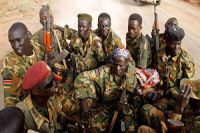Fighting goes on despite South Sudan ceasefire: UN

 The United Nations has confirmed reports of clashes in South Sudan between rebels and government forces despite the announcement of a ceasefire.
The United Nations has confirmed reports of clashes in South Sudan between rebels and government forces despite the announcement of a ceasefire.
On Thursday, representatives of South Sudanese President Salva Kiir and rebel leader Riek Machar signed a ceasefire agreement, which took effect at 1730 GMT on Friday.
“The UN Mission in South Sudan says that sporadic fighting took place in parts of the country today,” UN deputy spokesman Farhan Haq told reporters at the UN headquarters in New York on Friday.
He stated that some of the battles took place after the ceasefire came into effect.
The rebels accused the government troops of attacking their positions just ahead of the ceasefire, but the army said it knew nothing of any fighting since the agreement was reached in the Ethiopian capital Addis Ababa.
“It is critical that both parties implement the cessation of hostilities agreement in full and immediately,” the UN spokesman stressed.
Rival forces are still fighting to take control of several towns, including the strategic cities of Bor and Malakal, where there has been bitter fighting.
“It won’t happen overnight when there was so much fighting going on,” said one UN Security Council diplomat.
Mediators from the East African regional trading bloc Intergovernmental Authority on Development brokered the ceasefire deal, which is to put in place a verification and monitoring mechanism for the agreement and allow unrestricted access to aid workers.
The fighting between troops of President Kiir, who is from the Dinka ethnic group, and Machar, a Nuer, erupted around Juba on December 15, 2013.
The conflict soon turned into an all-out war between the army and defectors, with the violence taking on an ethnic dimension that pitted the president’s tribe against Machar’s.
The International Crisis Group said on January 9 that about 10,000 people had been killed in the violence.
“Given the intensity of fighting in over 30 different locations in the past three weeks, we are looking at a death toll approaching 10,000,” said Casie Copeland, an analyst at the International Crisis Group.
South Sudan gained independence in July 2011 after its people overwhelmingly voted in a referendum for a split from the North.
The government in Juba is grappling with rampant corruption, unrest and conflict in the deeply impoverished but oil-rich nation left devastated by decades of war.







